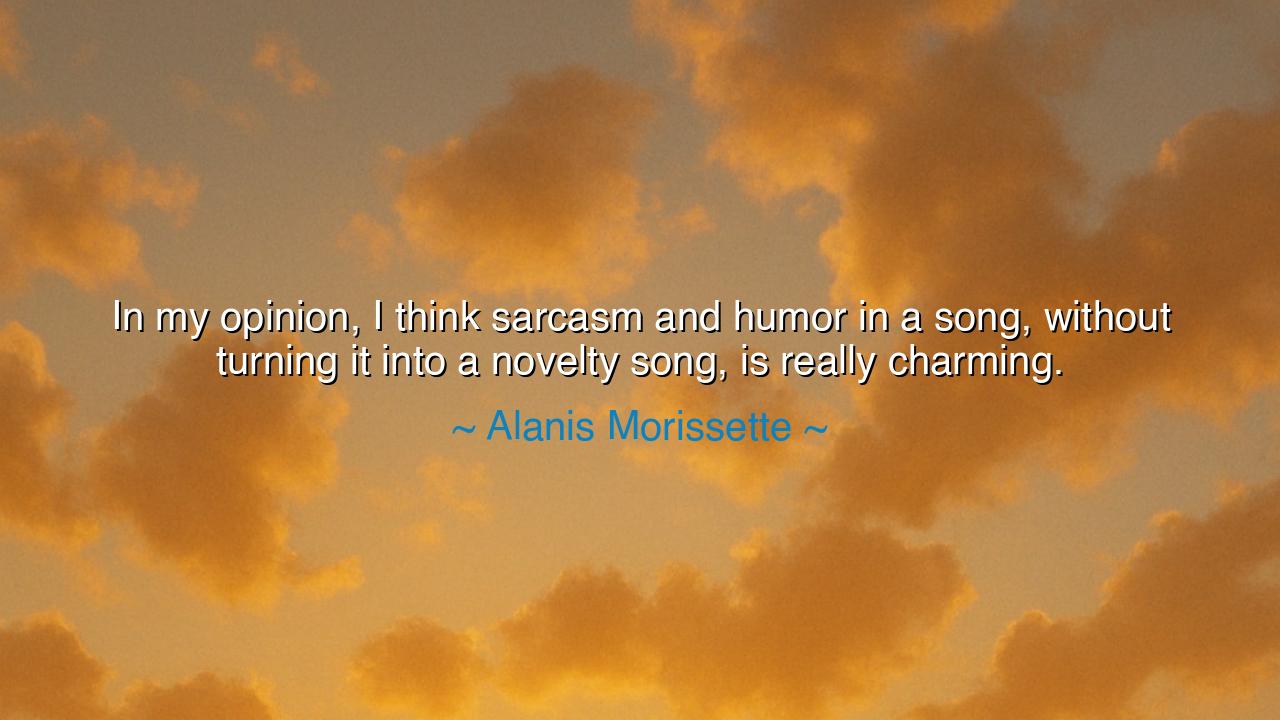
In my opinion, I think sarcasm and humor in a song, without
In my opinion, I think sarcasm and humor in a song, without turning it into a novelty song, is really charming.






When Alanis Morissette said, “In my opinion, I think sarcasm and humor in a song, without turning it into a novelty song, is really charming,” she revealed a subtle truth about the artistry of expression: that humor, when woven into creation with intelligence and grace, becomes a lens through which we perceive life’s ironies and contradictions. She does not seek mere amusement; she seeks resonance. To infuse a song with sarcasm and humor is to acknowledge the complexity of existence, to allow the listener both to feel and to smile, to reflect and to recognize the absurdity without sacrificing depth or authenticity.
The ancients would have understood this principle well. Greek dramatists, from Aristophanes to Menander, employed humor and irony within their tragedies and comedies, enriching their stories with layers of meaning. Humor was not frivolity; it was a tool of insight. The wise playwright knew that laughter, when carefully tempered, could illuminate truth as effectively as tears. In Morissette’s observation, we see the same artistry: sarcasm and humor, if skillfully handled, enhance emotional resonance without reducing art to mere novelty or spectacle.
To understand the charm of humor in music, one may recall Tom Lehrer, whose songs carried sharp wit and irony while remaining musically sophisticated. Lehrer did not rely on jokes alone; his humor was embedded in observation, critique, and intelligence. Similarly, Morissette’s view celebrates the ability to juxtapose serious emotion with clever satire — to confront life’s frustrations, absurdities, or contradictions, while still maintaining the integrity of the song as art. Humor becomes a vehicle for truth rather than a distraction from it.
Sarcasm, in particular, requires balance. It is a double-edged tool: if wielded carelessly, it wounds; if wielded artfully, it enlightens. Morissette’s insight recognizes that charm lies in subtlety and timing, in the ability to make the listener aware of life’s ironies without collapsing the work into a parody or novelty. Songs that achieve this do not merely entertain; they provoke reflection, empathy, and even catharsis. The humor becomes a bridge between artist and audience, allowing connection through shared understanding of human folly.
A historical example may be found in Bob Dylan, whose early songs often contained wry commentary on social and political realities. Within the irony and understated humor of his lyrics, audiences could detect both critique and compassion. The charm of Dylan’s work lies in this careful blending: humor and sarcasm deepen engagement without reducing the gravity of the subject. Morissette’s observation echoes this same principle: humor, when married to artistry, enhances rather than diminishes the experience.
Morissette also hints at a philosophical dimension: life itself is complex, often contradictory, and sometimes absurd. To recognize this through music is to offer the listener a reflection of their own experience. Humor and sarcasm in song can become a form of emotional intelligence, a demonstration that the artist perceives the world fully and is unafraid to communicate that perception honestly. This is why such songs are compelling; they respect the audience’s capacity for both laughter and contemplation.
The lesson, then, is enduring: embrace humor and irony in your creative expressions, but temper them with care and depth. Do not allow wit to overshadow substance, nor sarcasm to eclipse sincerity. Like Morissette, recognize that the true charm of artistry lies in its balance: the ability to illuminate life’s contradictions while honoring the listener’s capacity to feel, reflect, and smile. Humor becomes a tool of insight, a bridge of connection, and a celebration of human complexity.
In practical terms, this means observing the world attentively, finding irony and absurdity without cynicism, and embedding that understanding into creative work. Whether through music, writing, or storytelling, let humor and sarcasm enhance depth rather than replace it. As Alanis Morissette teaches, the most compelling art is not that which seeks only laughter, but that which invites both thought and delight, reminding us that the charm of creation lies in its ability to embrace the human experience fully — with insight, wit, and grace.






AAdministratorAdministrator
Welcome, honored guests. Please leave a comment, we will respond soon